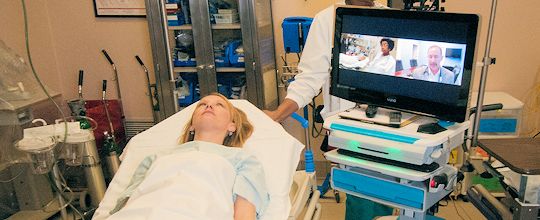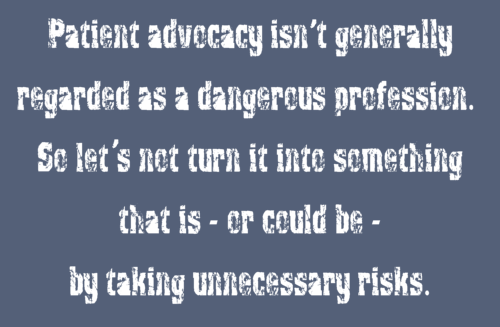In July 2015, we took a look at the case of Farid Fata, the Michigan oncologist who is now in prison on fraud charges because he diagnosed and treated more than 500 people for cancer they didn’t have, many of whom died.
Yes – you read that right. You read the part about treating more than 500 people for cancer they didn’t have. And, I hope you caught the part that he is in prison on FRAUD charges – not murder, not manslaughter – nothing that recognizes the horrible physical condition he left those patients in after aggressive chemo and radiation. Whatever he could make money from, that’s what he did, and that’s why he is in prison.
See: A Second Opinion Isn’t Good Enough
Shortly after publishing the post about second opinions, I wrote about how, if any of Fata’s patients had hired a patient advocate, they would not have become victims. There are tasks we do to help our clients that would have prevented harm once we were hired.
See: How Professional Patient Advocates Would Have Stopped Farid Fata
Then, last night, NBC’s Dateline took a more in-depth look at the case of Farid Fata, featuring interviews with a number of the patients he had treated, plus an interview with a nurse, Angela Swantek, who figured out what he was doing during a job interview three years before Farid was arrested. No, she didn’t take the job. Instead she blew him in – and the State of Michigan did nothing about it then. (I say KUDOs to her and a pox on the house of those people who decided not to investigate.)
What I learned during the Dateline interviews was that many (if not most or even all) of Fata’s victims had good health insurance.
Ding ding ding! The alarms went off – because that was not something I had written about previously in regards to Fata. And it’s most certainly an area where advocates can make a HUGE difference. And it almost always takes people by surprise until they realize how much sense it makes.
Further, it is VERY MUCH a point patient advocates must understand and articulate to clients and potential clients who have decent health insurance. That is: the better someone’s health insurance, the more apt they are to be overtested and/or overtreated.
See: Goldilocks, Dad and Finding Care That’s Just Right? (I think Dad’s great health insurance may have killed him.)

Fata’s transgressions were all about taking advantage of this point. Someone would be referred to him, he would take a look at their insurance, and then he would decide what all he could throw at them to make the most money from their time with him. Many of those interviewed on the Dateline program told Lester Holt that Fata had told them they would need aggressive chemo for the rest of their lives.
This is a uniquely American Healthcare System consequence. Since doctors are only paid for doing things (they are never paid for the time they spend with patients; they are paid only for what they can quantify in a CPT or DRG code) – their only path to making more money is to do more things – more testing, more treatment.
Better, more comprehensive insurance, means more tests and treatments will be approved, means the doctors will make more money. If a patient has high-deductible insurance, or very basic level insurance that doesn’t cover the more expensive “things” doctors can get paid for, then they will ask more questions, taking up more of the doctor’s or his/her staff’s time, engaging in a discussion. Further, there’s a good chance eventually insurance will decide not to cover the recommendation.
But when patients have broader coverage that is more likely to approve whatever the doctor recommends, and when those patients won’t have to pay anything (or pay very little) from their pockets, then they don’t ask questions. They acquiesce, because they don’t realize the harm, and because it never occurs to them not to trust the doctor who has made the recommendation.
This was of particular note in the Fata case because he owned not just the practice, but the testing lab, the infusion (chemo) center and the radiation center, too. He could make millions on doing “things” that didn’t really need doing at all!
Fata knew well how to play that game, and because he took it to the max, he got caught. But other doctors, practices and hospitals are doing the same thing every day – EVERY DAY – but they are doing it under the radar, and most will never be caught.
It’s another one of those YDKWYDK situations – you don’t know what you don’t know. But now YOU DO know! And it is therefore incumbent upon you to explain this to your clients and potential clients, then to question tests and treatments to prevent them from being overtested and overtreated. (APHA members can learn more about how to do this by listening to the Choosing Wisely podcast and finding the resources that go with it.)
There is a second side to the same coin we must be aware of, too. That is, that just because the insurer turns down a proposed test or treatment doesn’t mean that it’s a good idea to try to get them to reverse the denial. They may be preventing your client from a Fata-situation. You’ll need to investigate further.

Farid Fata is a monster. But he won’t harm any more patients because he’ll be in prison for the rest of his life.
I have nothing but sympathy and empathy for those patient-victims who suffered at his hands. I know what it’s like to be diagnosed with cancer when there is no cancer. I still suffer from PTSD. But I was never treated, so I can’t possibly understand that horrible double-whammy.
Because I know much of that experience, I also know that when faced with a horrible situation, there is no better catharsis that to know someone has learned from it, and that learning may prevent them from suffering the same fate. I hope this lesson for advocates will help some of those patients find a little corner of peace.
So I ask you, advocate-reader – please learn from the horrors these poor victims suffered. Talk to your clients about the extra vigilance that is required when they have good health insurance. It’s an important role for you as their advocate.
LEARN ABOUT APHA MEMBERSHIP | FIND MORE REASONS PATIENTS NEED ADVOCATES






I have and am living through this after 3 yrs passed since the lost of my 22 yr old son on 12/20/17 due to this same exact thing. As I tried to advocate on his behalf and encouraged him too, I I unfortunately did not know about this APHA community at that time. It was so hard trying to advocate with only our voices not being heard and no one else understanding and seeing the horrors and advantages taken on my son through misdiagnosis and not treating what he was hospitalized for. No one willing to go against what the doctor ordered. Switching over to a healthcare that accepted and even expedited treatments which ultimately was my son’s demise! No one knowing how or even willing to advocate on our behalf due to conflicts of interest if they are employed by the hospital, they couldn’t go against the hospital. And I was told this to my face and watched people being admonished for doing so in front us.
From this experience though, it gave me the push to be one who can help preventing this from happening to someone else and their family. There is such a need for patient advocacy or navigator. I am grateful to have found this community. I now know that I was not crazy, and was on the roght track. I now know that I am not alone and wasn’t the only one who suffered through this.
I’ve contacted the founder a couple of yrs ago and she was kind and reached back out to me. She was very knowledgeable and encouraging. I truly appreciated that. At that time my wounds were fresh and I couldn’t really focus. But now I am ready to soak up all of this knowledge and resources here to become the best advocate I can be and honor my son.
Thank you for all the hard work and time and effort put into this site and community.